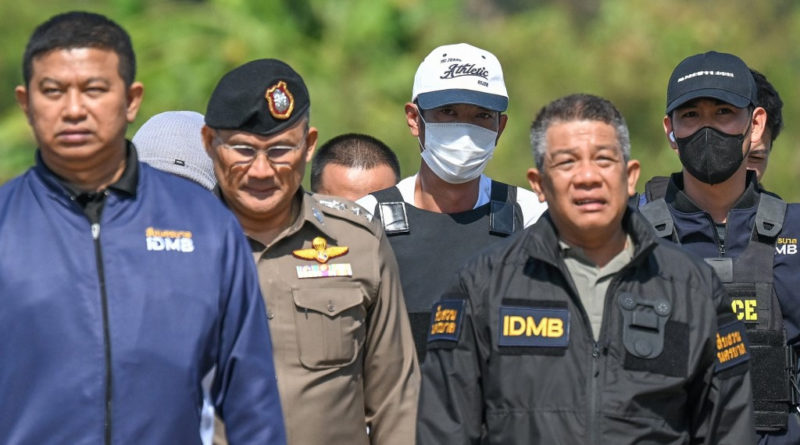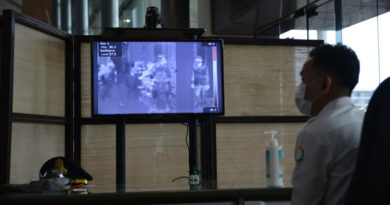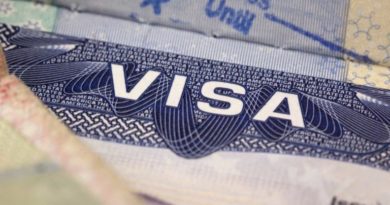OPINION-COLUMN | ACADEMIA: Thailand lets autocratic neighbors hunt down opponents on its soil
Ekalak Paenoi (center), a suspect in the alleged killing of Lim Kimya, a former lawmaker of the dissolved Cambodia National Rescue Party (CNRP), is escorted by police officers upon his return from Cambodia on Jan. 11, 2025, at the police airport in Bangkok. (AFP/Thai News Pix/Panumas Sanguanwong)
.
Whether through complicity or ignorance, Thailand is increasingly at the heart of foreign security operations targeting dissidents that have been deployed on its soil by authoritarian Southeast Asian regimes.
.
.
Zachary Abuza
The Jakarta Post

Even by Cambodian standards, it was a brazen attack on an opposition figure: Lim Kimya, a 73-year-old member of the banned Cambodia National Rescue Party (CNRP), was gunned down by an assassin on Jan. 7 in Bangkok.
.
The hit was the latest in a growing pattern in which governments in Southeast Asia are complicit in the killing or rendition of opposition figures from neighboring countries, or at least turn a blind eye to extralegal operations of their security forces within their borders.
.
This has been going on for years, but with little official accountability, security forces appear to be acting with more impunity, often in violation of the international legal norm of non-refoulement.
.
At the heart of this is Thailand, a magnet for migrants or refugees from poorer neighbors, whose government is increasingly willing to work with its authoritarian neighbors or is unable to prevent other security services from conducting operations on Thai soil.
.
Chinese security forces have long targeted dissidents in Thailand such as Gui Minhai, who was snatched from his holiday home in Pattaya in 2015, and Li Xin, who went missing in the country a year later. In both cases, the degree of Bangkok’s complicity is unclear, but its decisions reflect the vast asymmetry in power between China and Thailand.
.
There’s no such power imbalance among Southeast Asian states, though.
|
|
In a recent report, Human Rights Watch has described the traffic in targeted dissidents as a “swap mart”.
.
There is no evidence of any formal agreements between and among countries, but there’s clearly a lot of informal cooperation.
.
Lao authorities, for example, notoriously disappeared rural development expert Sombath Somphone in December 2012 after taking him into police custody, and they attempted to kill Anousa Luangsouphom in April 2023.
.
But less well known is their targeting of Free Lao activists on Thai soil.
.
In August 2019, Od Sayavong, a 34-year-old Thailand-based Lao activist, and his housemate went missing from his home in Bangkok. Thai authorities pled ignorance in the case and their investigation has stalled.
.
In May 2023, Kitiyano Bounsuan, a 56-year-old Thailand-based Lao democracy activist who had received UNHCR refugee status, was gunned down in Ubon Ratchathani province.
These incidents may represent a quid pro quo between Bangkok and Vientiane.
.
Following the Thai military’s seizure of power in May 2014, a number of democracy activists fled to Laos.
.
|
|
During an April 2018 visit to Bangkok, Lt. Gen. Souvone Leuangbounmy, chief of staff of the Lao People’s Armed Forces, pledged assistance to Gen. Prayuth Chan-o-cha in tracking down Thai activists.
.
In January 2019, the bodies of two anti-monarchist activists, Chatcharn Buppawan, 56, and Kraidej Luelert, 46, washed up on the Thai bank of the Mekong River. Another activist, Surachai Danwattananusorn, 78, went missing at the same time, but his body has never been found.
.
In 2020, Thai activist Wanchalearm Satsaksit was snatched from the streets of Phnom Penh, and just last November, Thailand deported six CNRP members who were immediately charged with treason upon their return to Cambodia.
.
No country has benefited more from Thailand’s cooperation or blind eye in recent years than Vietnam.
.
In January 2019, Thai authorities detained Radio Free Asia blogger Truong Duy Nhat, who was in the process of applying for refugee status, and turned him over to Vietnamese police who spirited him across the border to Laos and then Vietnam. In March 2020, a Vietnamese court sentenced Nhat to 10 years for fraud.
.
Thai authorities have denied involvement.
.
Nhat had fled to Thailand in 2016 after serving a two-year prison term for “abusing democratic freedoms” after writing blog posts that were critical of the Communist Party.
.
In April 2023, Vietnamese security forces allegedly abducted Duong Van Thai, 41, an exiled journalist who had fled to Thailand in 2019 fearing persecution, from outside his house in northern Bangkok. Security cameras captured his shrieks.
.
While Vietnamese authorities may be chastened about trying more snatch and grabs from the streets of Germany, they clearly feel they can act with impunity or tacit approval in Southeast Asia.
.
Vietnamese authorities have also pursued legal extraditions. In mid-2024, Thailand returned a Montagnard ethnic minority activist to Vietnam: Y Quynh Bdap had been living in Thailand since 2018 and had received United Nations refugee status.
.
Even more alarming, last March, a group of police from the Central Highland provinces of Dan Lak and Gia Lai were in Thailand conducting interviews in Montagnard refugee communities, trying to learn of Bdap’s whereabouts and to pressure asylum seekers to return to Vietnam. It is unlikely that the Vietnamese police could have operated so overtly without the approval and support of Thai security forces.
.
In January 2024, nearly 100 Montagnard suspects were tried and convicted for riots that killed nine people, including four policemen, and resulted in the burning of commune offices.
.
While we should not be surprised by the actions of Lao, Cambodian or Vietnamese security forces, Thailand is ostensibly a democracy.
.
Since the 2014 military coup in Bangkok, however, Thai authorities have either been complicit or turned a blind eye to the actions of the security forces of neighboring authoritarian countries.
.
The elected Thai government of Paetongtarn Shinawatra is already on its back feet after the courts ousted her predecessor, Srettha Thavisin.
.
Under military pressure, no Thai government can afford to be seen as anti-monarchist in any way.
.
To ensure access to exiled Thai anti-monarchists, Thailand has chosen to remain at the center of this informal compact to target neighboring dissidents.
|
|
—
The writer is a professor at the National War College in Washington and an adjunct at Georgetown University. The views expressed are personal.
|
|
BenarNews
Fri, January 17, 2025



 THE EDITOR
THE EDITOR







